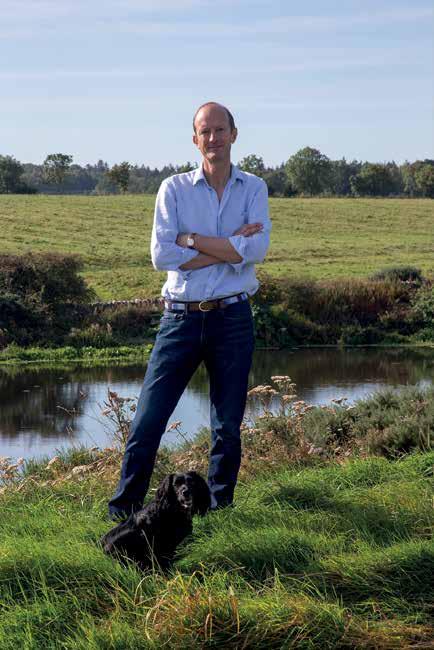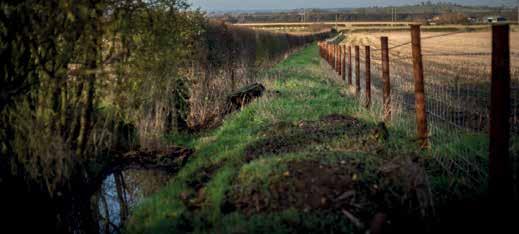
7 minute read
Water
Water management ‘will boost resilience to climate change’
Better water management is needed to increase resilience to drought and climate change, says a new report.
The Country Land and Business Association says the impact of climate change is clear and here to stay. The first few months of 2021 saw one of the driest Aprils on record – followed by one of the wettest Mays.
Some farms were submerged in water for over three months this past winter. This left many farmers unable to plant crops for an entire year. And the Met Office predicts that the risk of floods has increased by at least 20% and up to 90%.
The CLA’s Water Strategy: a vision for the water environment to 2030 ssays landowners could play a key role in improving the wider water environment by harnessing low-cost nature-based solutions.
Responsibility for flood defences is currently shared by the Environment Agency and lead local flood authorities (LLFAs), alongside landowners and farmers. But the CLA says the agency is often too slow to respond to essential maintenance.
This leaves rural communities vulnerable to serious flooding, says the CLA. Many landowners are already stepping-up to protect their local communities – but they are often uncertain whether they are allowed to undertake maintenance work.
Community supported organisations like internal drainage boards, are often far better placed than the Environment Agency to maintain main rivers. And the CLA argues these organisations should be allowed to take over responsibility for them.
Landowners have proven to be extremely successful at using their land to mitigate flood risks through Natural Flood Risk Management (NFM) projects.
These projects can involve creating wetlands and saltmarshes, or planting trees to stabilise riverbanks, slowing the flow of water and helping it to be absorbed, while also improving biodiversity, water quality, water availability and carbon storage.
More support
To support landowners in their desire to protect local communities and mitigate flood risk, the government needs to have a proper policy, says the CLA. It wants the Environment Agency to make the rights and responsibilities of landowners clear to allow for effective and flexible flood defence work – helping to avoid any unnecessary flooding of rural properties.
Maintaining flood defence assets – £75m of funding per year for maintenance of existing flood defence assets, on top of the funding already earmarked for new flood defence assets, that would provide cost effective flood defences while improving the environment.
Catchment-focused flood management – government to allow for regional approaches and flexibility, including the effective use of Natural Flood Risk Management projects to transfer flood risk responsibilities to the best-placed body to do so.
CLA president Mark Bridgeman said: “Many of these land managers already play
Farmers should have a bigger role in river maintenance, says Mark Bridgeman.
a crucial role in using their land to prevent local communities and businesses bearing the brunt of flood damage.
“Of course, this needs to come with the right government support and funding. But the solution to flood defences is sitting right on our doorstep at the fraction of the price of new infrastructure: natural flood risk management.”
Work together to secure fair share of water – NFU
The NFU has filmed a mock weather forecast to highlight the importance of a fair share of water for crop and livestock production.
The forecast for 11 July 2050 highlights the impact of climate change – including scorching summer temperatures – that growers and livestock producers can expect to experience on their farms.
The Met Office predicts UK summer heatwaves every other year by 2050. The forecast – on YouTube – is presented by farmer James Johnson. It predicts temperatures of 45ºC and a widespread risk of standing crop fires.
The NFU forecast warns farmers to maintain air conditioning units in their sheds amid serious concerns about animal heat stress. And it suggests planting Mediterranean drought-resistant trees to help provide shade for livestock.
Integrated strategy
The NFU released the forecast to emphasise the need for a national integrated water management strategy. Doing so would help farmers achieve their goal of leading the world in climate-friendly food production, it said.
NFU president Minette Batters has repeatedly called on the government, water companies and farmers to invest properly in water management. A collaborative approach was essential to secure an adequate water into the future, she said.
“We cannot underestimate the importance of food production as we chart a course through our climate challenges. We can deliver on our net zero pledge while retaining, if not growing, our agricultural capacity, but adopting a new approach to water is vital.”
The Intergovernmental Panel on Climate Change already accepts that climate change is affecting food security, predicting that food supply could well become more unstable as extreme weather leads to greater disruption of supply chains.
“We must make far better use of abundant winter rainfall, rather than simply pumping it out into the North Sea as we currently do,” said Mrs Batters. “This will require a collaborative approach involving both public and private sector partners and farmers.”
Success for scheme that pays farmers to reduce pollution
One of the UK’s biggest water companies has seen a big return on investment after paying farmers to reduce pollution.
Severn Trent’s Farming for Water initiative saves up to £20 in water treatment costs for every £1 it spends in support for more than 5,000 farmers across the Midlands, says Jodie Rettino, the company’s catchment and biodiversity lead.
“When it comes to water, farmers and Severn Trent have common goals. Ultimately, we both need water to be in the right place at the right time and it needs to be good quality. That’s why it makes sense for collaboration to improve water quality upstream.
“The grants offered to farmers in the Midlands have multifaceted benefi ts. They improve water quality for our customers, enhance the wider environment and have numerous productivity benefi ts for producers.”
Other areas where collaboration is working
Over the past six years, Severn Trent has worked with over 4,000 farmers as part of the Farm to Tap scheme, – which paid farmers up to £5/ha to reduce watercourse pollution by avoiding metaldehyde slug pellets.
To date, the scheme has been very successful. Dr Rettino said: “We’ve seen a 68% reduction in metaldehyde peaks and there’s been no metaldehyde failures at treatment works for the last two years.”
She added: “Ultimately, farmers need to start thinking about pesticide use in a diff erent way, so that they implement an integrated approach, using cultural options fi rst where possible. Pesticides should be a last resort.”
Farmers can make applications to join the Farm to Tap scheme until 15 September. To fi nd out if you are eligible, visit: www. stwater.co.uk/about-us/environment/ catchment-management/farm-to-tap/
Amazing results
In the last fi ve years, more than £5.7 million has been invested in Severn Trent’s environmental protection scheme (STEPS). It helps farmers change their practices to enhance water quality, farm productivity and the wider farm environment.
Dr Rettino says: “We’ve seen amazing results which include a 90% reduction in pesticide peaks over the last fi ve years. This milestone has been achieved by farmers recognising the value of the mutual benefi ts that match-funded grants offer.”
Many producers invest the money from STEP grants into marginal land to avoid taking valuable land out of production. This includes planting buffer strips or building beetle banks, which bring biodiversity benefi ts as well as water improvements.
“About ten years ago we were looking to install a treatment plant, specifi cally to remove pesticides at the treatment works in Tittesworth, which would have cost several million pounds,” said Dr Rettino.
Through catchment management work and investment with farmers, we reduced pesticide contamination to a level that meant treatment equipment wasn’t required.”
Although a lot of progress has already been made in reducing pesticide levels, Dr Rettino says there is still more work to be done when it comes to reducing nitrates and cryptosporidium in watercourses.
Grant recipient and farmer James Grant recipient and farmer James Kent said equipment purchased through the scheme had helped him reduce fertiliser usage. Water quality had improved through precision apA 95% reduction in pesticide peaks over last fi ve years
plications and the farm is using less fertiliser – a big cost saving.
“We were already saving 5% a year on fertiliser costs using GPS guidance equipment purchased from our Severn Trent grant. But with a further grant, we now have variable rate application and section control, which has saved us more than 10% a year.”
Funding available
Dr Rettino is encouraging more farmers to apply for STEPS funding, with the application window open for another six months. Getting involved would help farmers make the shift towards farming with the wider environment in mind, she says.
Although change brings opportunities, Dr Rettino says farmers should still use Severn Trent advice to ensure they are prepared to take the leap – and see what postive change can do for their business.
For more information and the full grant eligibility criteria. visit www. stwater.co.uk/steps. Alternatively, contact your local Severn Trent agricultural adviser. Applications are open until 31 January 2022.



